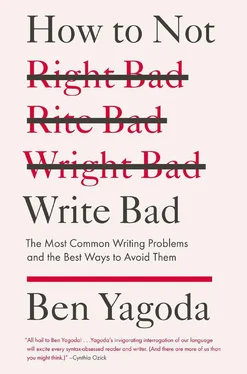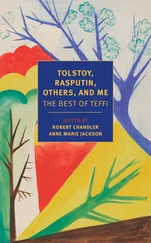At the store’s opening ceremony tomorrow, baseball star Albert Pujols will give a speech. The first ten customers will receive autographed baseballs.
A series of long sentences is even worse. Not only does rhythm go by the boards, but it quickly becomes hard for the reader to make his or her way. It’s like walking in the jungle and finding that all of a sudden the vegetation has gotten impassably thick. Fortunately, chopping up sentences is usually pretty easy. I certainly spend a lot of my revising time doing just that. Take a look at the first draft of a passage in this book:
[ If you’re on one side or the other and trying to stoke the fire on any of these issues, go nuts with the terms I’ve been discussing and the many others like them. However, if you’re writing in an intelligent, nonpartisan way, avoid them at all costs, instead seeking words that accurately and temperately convey meaning, such as legalized abortion, government spending, taxes (in general) and the estate tax (in particular). ]
Reading it aloud, I could see something was off with the second sentence. Like a rapper or basketball player, I tend to try for a strong “flow,” hence the phrase instead seeking and what came after (a lot). But I could tell that right about there, I had to shut the faucet off.
If you’re on one side or the other and trying to stoke the fire on any of these issues, go nuts with the terms I’ve been discussing and the many others like them. However, if you’re writing in an intelligent, nonpartisan way, avoid them at all costs. Instead, seek out words that accurately and temperately convey meaning, such as legalized abortion, government spending, taxes (in general), and the estate tax (in particular).
Follow a similar strategy with paragraphs. If you scan down the screen or the page, and they all seem to be roughly the same size, work on varying them. It’s usually easy to fuse two short paragraphs together. Breaking a long one up can be more challenging, but you can generally discern a sort of point of perforation where it can be divided. If you can’t, leave it be.
By novelty , I mean don’t repeat words, phrase structures, figures of speech, or ideas. By the same token, you should make sure to maintain the tone or register of your writing; that’s a matter of being consistent.
Sentence to sentence or paragraph to paragraph, transitions are a challenge. Certainly, standards differ according to what you are writing and your own style. A traditional essay requires a lot of transitional words and phrases along the lines of consequently, needless to say, however , and furthermore. However, transitions are famously not allowed in the traditional inverted-pyramid newspaper article. Whatever the form, the most important thing is to have a strong sense in your own mind of the relationship of one sentence or paragraph to the next. Sometime you’ll have to specify the relationship, sometimes you won’t. If you don’t spell out enough, you’ll drop one non sequitur after the other and generally baffle readers. But if you spell out too much, you may come off as ponderous, too literal, and almost overprotective, like a parent who leads his child by the hand even though the kid is a high schooler. Ultimately, as with so much else, it’s a mama bear, papa bear, and baby bear kind of thing: you’re the one who has to decide what’s just right. If you turn off the music, you’re mindful, and you read, read, read, you can do it.
*As I’ve noted, I teach journalism, and beginning reporters are often tempted to overuse exclamation points in quoted material: “‘I hope we have a great year!’ the coach said.” That doesn’t come off well. If you use exclamation points at all in quotes, save them for when the speaker is screaming his or her lungs out.
*It could be argued that those terms are themselves pseudo-clinical euphemisms for four-letter words beginning with p and s . I leave that determination to wiser heads than mine.
*In addition, “contaminated salami” is a kind of passive adjective, being shorthand for “salami that has been contaminated.”
This is my third book about words. They’ve come in kind of a weird order. The first, The Sound on the Page: Style and Voice in Writing, dealt with some rather advanced matters and took as object lessons the very best writers, now and through history. The second, When You Catch an Adjective, Kill It: The Parts of Speech, for Better and/or Worse , was about, among other things, the cool and expressive things all sorts of people do with the English language, things like using the word chill as a noun, adjective, and verb (transitive and intransitive). And now I’m telling you how to not write bad. I shudder to think what the next book will be.
In a way, I’ve been working on this book for twenty years, which is how long I’ve been teaching writing at the University of Delaware. The job has been a picture window on the way people write now — and by people I mean bright students at a selective university who have elected to take advanced journalism and other writing classes. There are some nice views out that window, but on the whole the picture isn’t pretty. As the years and the articles, essays, assignments, papers, and other assignments built up, I came to realize that my students, generally speaking, were not adept. Writing well was not the task at hand for most of them. A more pressing need was getting rid of their bad habits and getting acquainted with some core principles.
Helping them achieve this has been a challenge that, as Dr. Johnson would put it, concentrated my mind wonderfully. It made me think about writing in new ways, and appreciate it in new ways, too. I believe the other teachers out there will back me up when I say that nothing in my professional life is more gratifying than reading a great piece of work by a student — unless it’s reading a great piece of work by a student who started out the semester not that great. I still remember an article written in my very first class in 1992. It was Tye Comer’s on-the-scene piece about a “rave”—then a phenomenon so new that it demanded quotation marks. It was fantastic, and I gave it a well-deserved A+. I remember so many other outstanding pieces over the years, including lines that knocked me out when I read them and get me misty-eyed when I think back on them. So thanks to those who gave me such pleasure, and to all of you, for what you helped me to figure out.
A secondary pleasure has been following the careers of some of these folks. (Tye, for example, is an editor and writer with Billboard magazine; I’ve just been enjoying reading his posts from the Coachella Festival, which, come to think of it, is a rave of sorts.) Some I’ve become friends with, including Jocelyn Terranova, who provided excellent research assistance for this book, as she has for others of mine. Another student from those early years is Devin Harner, now a fellow journalism professor and a welcoming sounding board for ideas and problems.
I think of my colleagues from the University of Delaware as teammates, always ready to throw me a buddy pass or call my number in the huddle. I have had many fun and fruitful conversations about writing with Debby Andrews, Dee Baer, Steve Bernhardt, Jim Dean, Dawn Fallik, McKay Jenkins, Kevin Kerrane, Don Mell, Charley Robinson, and lots of others in Memorial Hall. John Jebb, going above and beyond the call of duty, deaccessioned a few volumes from his vast library on writing, and gave them to me. Linda Stein and Susan Brynteson, of UD’s proper library, were greatly supportive. Beyond campus, I’ve benefited from conversations and e-mail exchanges with Bruce Beans, Wes Davis, David Friedman, John Grossmann, John Marchese, Geoffrey Pullum, and Bill Stempel.
Читать дальше












